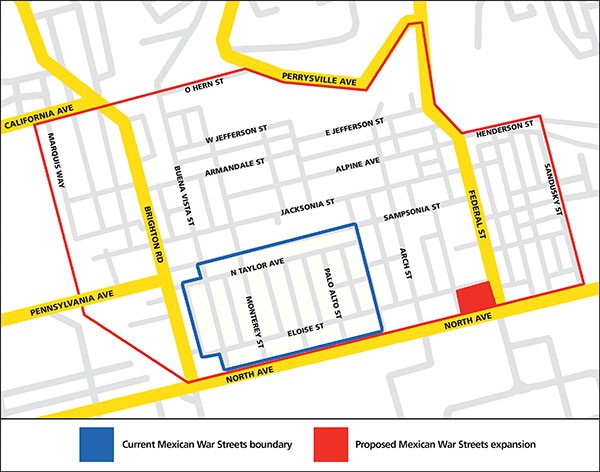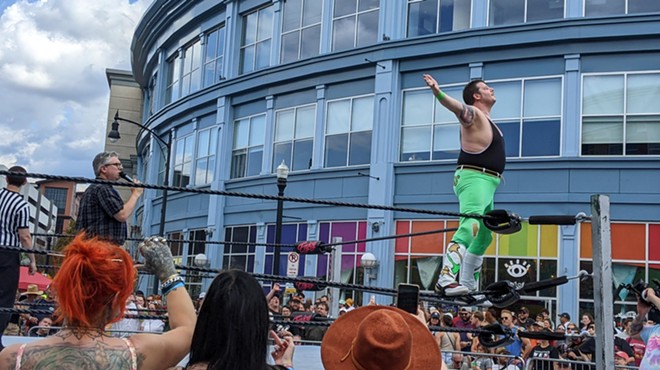While Pittsburgh City Council voted against the expansion of the Mexican War Streets historic district in June, the issue remains a sore spot for North Side residents.
Months later, proponents of the expansion say council's failure to meet a voting deadline means the historic district will be expanded whether their opponents like it or not. But the district's councilor says all deadlines have been met and he's even working on a compromise plan that he hopes will satisfy residents on both sides of the debate.
"We want to see an historic-district expansion and we know city council was 10 days late in voting on it," says Mexican War Streets Society President Paul Jones. "The law is very clear."
According to city code, city council has 120 days to vote on a recommendation by the City Planning Commission from the time council is notified of the decision. If council does not meet the deadline, the plan is approved by default.
However, both sides are at odds over when exactly the 120-day clock started running. The planning commission voted in favor of the expansion Feb. 10. Council was notified of the decision in a letter dated March 1, and voted against the measure on June 19.
"It is my understanding that city council followed the code and at no point were we ever in violation of it," says Councilor Daniel Lavelle, who represents the Mexican War Streets and the proposed expansion area.
While it would appear council met its deadline by voting within 120 days of receiving the planning commission's recommendation, city code also dictates council must hold a public hearing within 120 days, but doesn't specify if that deadline begins at the actual vote or the council notification.
"Where Councilfails to hold the required public hearing within 120 days from the date of the Historic Review Commission and the Planning Commission's recommendations, the failure of Council to act shall be a deemed approval if both the Historic Review Commission and the Planning Commission gave affirmative recommendations for the historic designation," the code states.
The Mexican War Streets Society voted in October to spend $10,000 to support an appeal to use the city code and other evidence to challenge the city-council decision. Property owners Kirk Burkley, Todd Kilgore and Jeffrey Diurba filed the appeal in July.
"The public hearing must be held within 120 days," of the planning commission's vote, Burkley says.
If the historic district were expanded, property owners in the new district would have to receive approval from the Historic Review Commission for any exterior alterations they want to make to their buildings. In a historic district, property owners cannot alter the historic look of buildings.
Demolition in a historic district must also be reviewed by the commission, which is what initially drew support for the MWS expansion; however, demolitions can still occur if a building is a safety hazard.
Lavelle says he voted against the expansion because after tallying responses from the community, which included statements made at the public hearing and calls to his office, 75 percent of those living in the proposed expansion area said they were against the expansion.
While the appeal won't be heard until January, Lavelle has been working on an alternative to the historic-district expansion. In July, city council passed a resolution authorizing and directing the director of City Planning to start the process of creating conservation districts in the city, which Lavelle says offer the benefits of a historic district without the harsh restrictions.
"[A conservation district] still ensures development is consensual. It's similar in nature but less strict. It still requires a higher level of review," Lavelle says. "I believe it's the best compromise possible."
Council also placed a moratorium on demolition in the area proposed for the historic-district expansion, unless a property presents a public safety hazard. This action addressed the community's desire to reduce demolitions while avoiding the increased cost sometimes associated with maintaining a building's historical appearance.
"If demolitions are really the biggest concern and there is so much opposition to the specific overhead of a historic district, then why aren't we pursuing other options?" asks Jacob Anderson, a property-owner who lives in the expansion zone.
Unlike a historic district, a conservation district is a zoning designation that does not protect specific existing building features; only major alterations, additions and new construction are reviewed. But Lavelle says even this won't be enforced in the North Side if the community doesn't want it.
"At the end of the day, if the community stands up and says they don't want a conservation district," Lavelle says, "we don't have to do it there."















